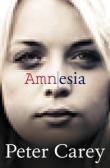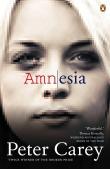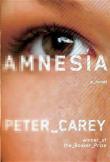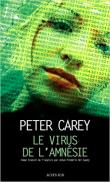AustLit
Latest Issues
AbstractHistoryArchive Description
''It was a spring evening in Washington DC; a chilly autumn morning in Melbourne; it was exactly 22.00 Greenwich Mean Time when a worm entered the computerised control systems of hundreds of Australian prisons and released the locks in many places of incarceration, some of which the hacker could not have known existed. Because Australian prison security was, in the year 2010, mostly designed and sold by American corporations the worm immediately infected 117 US federal correctional facilities, 1,700 prisons, and over 3,000 county jails. Wherever it went, it traveled underground, in darkness, like a bushfire burning in the roots of trees. Reaching its destinations it announced itself: THE CORPORATION IS UNDER OUR CONTROL. THE ANGEL DECLARES YOU FREE.'
'Has a young Australian woman declared cyber war on the United States? Or was her Angel Worm intended only to open the prison doors of those unfortunates detained by Australia's harsh immigration policies? Did America suffer collateral damage? Is she innocent? Can she be saved? ' (Publication abstract)
Notes
-
Dedication: For Frances Coady
Publication Details of Only Known VersionEarliest 2 Known Versions of
Other Formats
- Sound recording.
- Large print.
Works about this Work
-
Local Publisher, Global Agent
2023
single work
criticism
— Appears in: Peter Carey : The Making of a Global Novelist 2023; (p. 133-189)'This chapter focuses on three late-career Carey novels, namely My Life as a Fake, Parrot and Olivier in America, and Amnesia, on the thread to complete my analysis of Carey’s ongoing engagement in and around his fiction with the status of the Australian author in the transnational literary marketplace. Carey’s visibility in this period is marked by his shifting position in relation to the globalising publishing industry, the rise of digital publishing, and the mutations of academic and political recognition into convertible cultural capital in the literary field. These changes in practice and modes of recognition are analogous with the aggressive move towards monopoly capitalism by corporate systems in liberal democracies, including Australia.' (Publication abstract)
-
Anxieties of Obsolescence and Transformation : Digital Technology in Contemporary Australian Literary Fiction
2019
single work
criticism
— Appears in: TEXT Special Issue Website Series , October no. 57 2019;'When addressing the rise of mass media, literary authors of the late twentieth century often expressed an ‘anxiety of obsolescence’ (Fitzpatrick 2006) in their work: an acute awareness of being potentially displaced. This often led them to adopt an attitude of defiance in the face of technological change.
'Many contemporary literary authors adopt a similar oppositional attitude towards the rise and encroachment of networked technology, but retreating to the increasingly peripheral territory of ‘pure’ print-based literature is no longer easy. Digital technology presents not only the possibility of displacement but also that of transformation, with its spread threatening to fundamentally alter the practice of reading and writing.
'Possibly in response to the radical upheavals faced by Australian literary culture due to the rise of electronic publishing since 2012, recent works by three established Australian authors – Amnesia by Peter Carey (2014), the Wisdom Tree novella sequence by Nick Earls (2016), and The Life to Come by Michelle de Kretser (2017) – examine the ways in which networked technologies challenge or complicate the role, identity and practice of the contemporary print-oriented writer. The telling connection is that they present the relationship between print-based writers and networked technology as being transformative rather than simply oppositional, demonstrating the emergence of complex and nuanced responses to the rise of networked technology in Australian literature.' (Publication abstract)
-
'Shades of the Prison House': Reading Richard Flanagan’s The Narrow Road to the Deep North and Peter Carey’s Amnesia
2017
single work
criticism
— Appears in: Journal of Postcolonial Writing , vol. 53 no. 5 2017; (p. 578-589)'Australian writers from Marcus Clarke to the present day have used convictism to explore the way in which settler Australians have viewed their past and its influence on contemporary society. Convict fictions have been central to creating and reinforcing these Australians’ sense of their identity and history, and the form of the convict novel has been resistant to attempts to rewrite the traditional narrative of the past. This article argues that the underlying tropes and patterns of the convict novel have also shaped the ways in which other historical fictions have represented the past. It looks in detail at two recent fictions which use the conventions of the convict novel to examine more recent periods of Australian history and suggests that, like the traditional convict novel, their attempts to rewrite the settler narrative have been undermined by a nostalgia for the past which that narrative depicts.' (Abstract)
-
Utopia and Utopian Studies in Australia
2016
single work
criticism
— Appears in: Utopian Studies , vol. 27 no. 2 2016; (p. 200-209) 'There are no independently Australian translations of Thomas More’s Utopia. Nor is there any equivalent in Australia to the Society for Utopian Studies in North America or the Utopian Studies Society in Europe. Nor are there any extant formal research groups or undergraduate or graduate courses in utopian studies. There are, however, distinctively Australian traditions of utopian writing, both eutopian and dystopian, and also a limited field of Australian utopian studies, essentially the work of individual scholars. This article attempts a brief description of both.' (Publication summary) -
Melbourne, City of Literature
2016
single work
essay
— Appears in: World Literature Today , March vol. 90 no. 2 2016; (p. 5)
-
Headlong into Recent History
Carey's Timely Work Hard to Forget
2014
single work
review
— Appears in: The Sydney Morning Herald , 11-12 October 2014; (p. 32-33) The Canberra Times , 11 October 2014; (p. 23)
— Review of Amnesia 2014 single work novel -
The Truth? You Want to Pull a Gun on It
2014
single work
review
— Appears in: The Weekend Australian , 11-12 October 2014; (p. 16-17)
— Review of Amnesia 2014 single work novel -
For Peter Carey, the Whitlam Dismissal More Than a Memory
Conspiring to Create New Hero
2014
single work
review
— Appears in: The Age , 21 October 2014; (p. 10) The Sydney Morning Herald , 21 October 2014; (p. 18)
— Review of Amnesia 2014 single work novel -
Twenty-First-Century Blues : A Distinctly New Moment in Peter Carey's Career
2014
single work
review
— Appears in: Australian Book Review , October no. 365 2014; (p. 29-30)
— Review of Amnesia 2014 single work novel -
When the Worm Turns
2014
single work
review
— Appears in: The Courier-Mail , 1 November 2014; (p. 6-7)
— Review of Amnesia 2014 single work novel 'It's about cyber conspiracy and it's a rollicking read - Peter Carey's latest novel trawls through the Australian 'blurbs, even revisiting the infamous Battle of Brisbane of 1942...' -
Short Term Memory
2014
single work
column
— Appears in: The Weekend Australian , 4-5 October 2014; (p. 8-9) 'Australia, and its most famous political moment, remains a wellspring of inspiration for Peter Carey, writes Stephen Romei.' -
The Good Life : Lunch with Peter Carey
2014
single work
column
— Appears in: The Age , 22 November 2014; (p. 4) -
The Persistence of Memory
2014
single work
column
— Appears in: The Saturday Paper , 6-12 December 2014; (p. 18-19) 'He failed English Literature at Geelong Grammer, but the long-time New York resident became a world-renowned man of letters and has twice won the Booker Proze. Peter Carey's latest novel, Amnesia, provides further evidence he will never forget where he came from. ' -
Patrick Allington in Conversation with Peter Carey
2015
single work
interview
— Appears in: Kill Your Darlings , January no. 20 2015; (p. 139-160) -
Melbourne, City of Literature
2016
single work
essay
— Appears in: World Literature Today , March vol. 90 no. 2 2016; (p. 5)
Awards
- 2015 shortlisted Prime Minister's Literary Awards — Fiction
- 2015 shortlisted Australian Book Industry Awards (ABIA) — Australian Literary Fiction Book of the Year
- 2015 longlisted ASAL Awards — ALS Gold Medal
- 2015 shortlisted Indie Awards — Fiction










